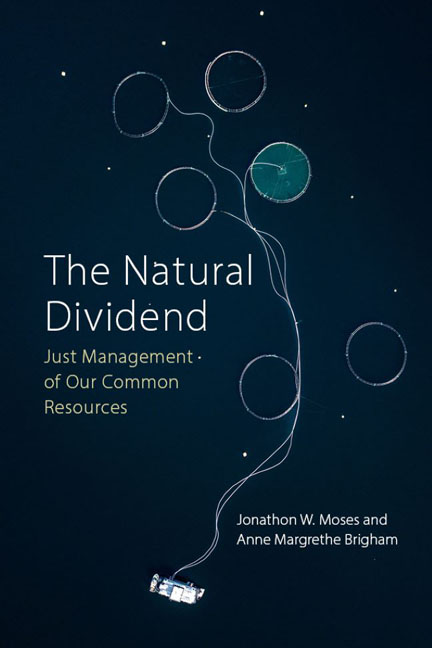Book contents
- Frontmatter
- Dedication
- Contents
- Acknowledgements
- Abbreviations
- 1 Introduction
- 2 Who owns the sun?
- 3 The Natural Dividend
- 4 The earth: the market for land
- 5 The sea: the market for salmon
- 6 The sky above: the market for renewable energy
- 7 The earth beneath: the market for fossil and mineral resources
- 8 A common market? The market for global resources
- 9 Conclusion
- References
- Index
5 - The sea: the market for salmon
Published online by Cambridge University Press: 20 January 2024
- Frontmatter
- Dedication
- Contents
- Acknowledgements
- Abbreviations
- 1 Introduction
- 2 Who owns the sun?
- 3 The Natural Dividend
- 4 The earth: the market for land
- 5 The sea: the market for salmon
- 6 The sky above: the market for renewable energy
- 7 The earth beneath: the market for fossil and mineral resources
- 8 A common market? The market for global resources
- 9 Conclusion
- References
- Index
Summary
In this book, land is placed squarely in the middle of a three-dimensional study. We do this because the world has a great deal of experience in managing land resources, and this experience is bound to influence our approach to the management of other natural resources. In subsequent chapters we consider the management of resources that exist above and below the land. In this chapter we move laterally: from land to the water that surrounds it. In doing so, we move from the solid to the soft, in more ways than one.
To paraphrase Arthur C. Clarke, ours is a watery planet, yet we call it “earth”. As we noted in the introduction, seven-tenths of the earth's surface is covered by water. Because the sea is so vast, and because it runs so deep, something like 95 per cent of the habitable space on our planet is found under water. And yet the management of these vast marine resources receives remarkably little public or academic attention.
Like the resources found on land, water is also essential to our survival – in both its fresh and salty variants. This is both clear and obvious with respect to fresh water, which Vaclav Smil (2022: 173) describes as “a perfect example of an almost universally mismanaged resource, with the added complication of highly uneven access”. Indeed, on 28 July 2010 the UN General Assembly explicitly recognized the human right to clean drinking water and sanitation with UN Resolution 64/292 (UN 2010). But our reliance on water stretches beyond this important UN resolution. In addition to our need to consume water, we need water to irrigate our crops and to provide habitats for additional human food sources, and water – in the form of hydroelectric power – is an important source of energy. These are the many aspects of water management that we wish we could address; each has its own list of challenges, and each has the potential to generate a Natural Dividend. But our focus in this chapter is on fish; in particular, on the farming of fish.
- Type
- Chapter
- Information
- The Natural DividendJust Management of our Common Resources, pp. 107 - 138Publisher: Agenda PublishingPrint publication year: 2023



